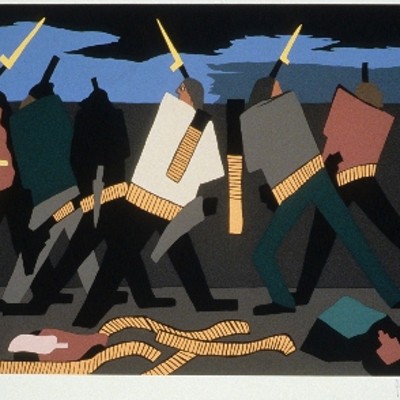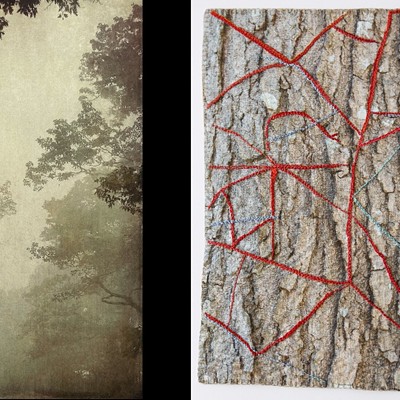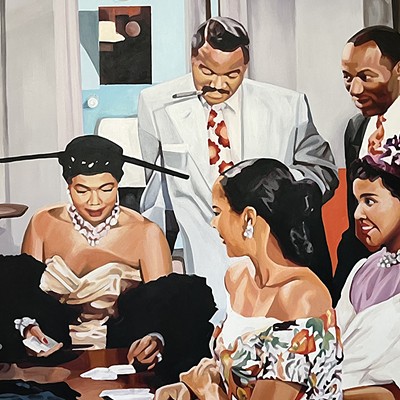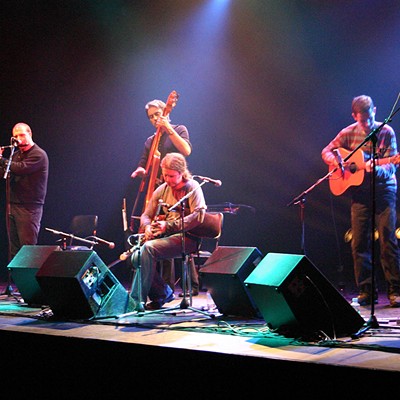His elderly neighbor, Maryjohnny, wants to know "where did he put our Padraig when he dug him up...and where did he put our Bridgit when he dug her up...and where did he put my poor ma and da when he dug them up is the biggest question!"
Mick grows weary of her probing. He knows that the villagers suspect that his wife Oona's death was more than a "pure drink-driving." They whisper that Mick cracked her skull first, and then drove her deliberate-like into a brick wall to ward off suspicion. So after Maryjohnny pesters him about the bones one time too many, he confirms her worst fears out of pure malice.
"Oh, for the hundredth fecking time, is it? I'll tell you what I did with them. I hit them with a hammer until they were dust and I pegged them be the bucketload into the slurry."
Then again, maybe he didn't. No, indeed, on second thought, what he's done with the old bones is "seal them in a bag and let them sink to the bottom of the lake and a string of prayers I say over them as I'm doing so."
The truth is flexible, to say the least, in A Skull in Connemara, a 1997 play by Martin McDonagh now on the boards at Tucson's Quintessential Stage. A short play in four scenes, peopled by only four characters, Skull's plot twists and turns as violently as the doomed car of the drunken Dowd the night he killed his Oona. As this blackest of black comedies begins, it's Oona's turn to be dug up, and the watchful eyes of the community are on Dowd. Will his responses to her decaying body reveal his guilt?
This sounds like a setup for a conventional whodunit, but this is a play that only appears to be realistic in an Ireland that only appears to be traditional. Skulls are smashed drunkenly and the dead walk unexpectedly, while the conversation is sprinkled with references to impossibly old American television reruns, like Starsky and Hutch and Petrocelli. Even the priest has lost his power. No one can remember whether his name is Welsh or Walsh, and he's only consulted on such theological niceties as whether Maryjohnny ought to be banned from bingo or whether the church allows dead "willys" to be buried with their deceased owners.
McDonagh, the London-born son of Irish parents, is the latest wunderkind of New York, London and Irish stages. Called the most important Irish playwright since the great writers of the Irish Renaissance a century ago, his Beauty Queen of Leenane was staged when he was only 25. A Skull in Connemara, the second play in The Leenane Trilogy, followed shortly thereafter. The 30-something McDonagh spent his childhood summers in Ireland's western County Galway, a remote, rural country that gave him the setting for his plays. (The 1990 movie The Field was filmed in the village of Leenane.) He easily absorbed the idiosyncrasies of Irish lingo, and the dialogue of his plays rushes out in astonishing flights of poetic speech, veering off crazily in all directions.
Yet McDonagh's wicked portrayals of Irish character have won him the same kind of opprobrious hits once leveled at J.M. Synge, whose now-classic Playboy of the Western World originally provoked riots. McDonagh has been reviled for the brutishness of his characters -- one writer called them "tragicomic grotesques" -- for their drunken violence, and for their lack of direction in a brave new world where "feck this" and "feck that" has replaced faith. Much of recent Irish theatre has been naturalistic -- think of Dancing at Lughnasa by Brian Friel, a celebration of peasant strength in the face of adversity -- but McDonagh is a throwback to the pioneering Irish theatre where language "creates a rival world which may displace the world of facts or alter it." Significantly, McDonagh drew the title A Skull in Connemara from a line in Waiting for Godot, paying homage to Samuel Beckett's French-Irish existentialism.
Quintessential, a small company not afraid to take on weighty classics or prickly new plays like this one, has done a fine job by McDonagh. The tiny stage at the downtown theatre must combine both sets that the playwright calls for: in Dylan Smith's hands, Mick's humble cottage at stage right meshes congenially with the graveyard at left. Director Brian Kearney ably leads his actors through the pell-mell script. Brian Weese, a newcomer to Tucson, turns out a mercurial Mick, easily veering from sympathetic widower to murderous skull smasher. He handles the Irish accent well, too, unlike Dale Jeter who plays the simple Mairtin, the nonstop talker who is Mick's graveyard helper. Jeter's a fine actor, but his brogue is so high-pitched it's hard to understand.
Marian Wald is lively in the part of Maryjohnny while Tony Eckstat is Mairtin's brother Tom, a bumbling provincial policeman who longs for "there to be bodies flying about everywhere" just like on Hill Street Blues. But the real star of the show is McDonagh's language. When Tom at long last gets his chance to do some real police work, Mick denounces him. His take-no-pauses speech is typical of the whole play, whose breathless sentences are so run-on they run away.
"But, sure, if down the disco (someone) was, how would I have ended up with his bastard brains dripping down the bloody front of me? D'you see how great a copper he is, Maryjohnny, with his skulls and his solving and lettuces in empty fridges, yet doesn't bat an eye at a blood-soaked man standing whap-bang in front of the feck-brained fool..."
A Skull in Connemara continues at 8 p.m. Friday and Saturday, and 4 p.m. Sunday, through April 16 at Quintessential Stage, 118 S. Fifth Ave. Tickets are $12, $10 for students with ID, seniors and military. For reservations and information, call 798-0708.











